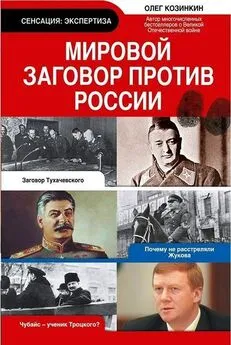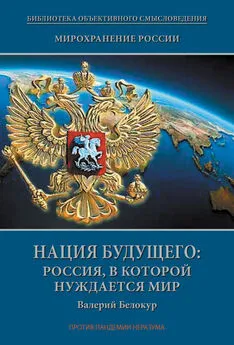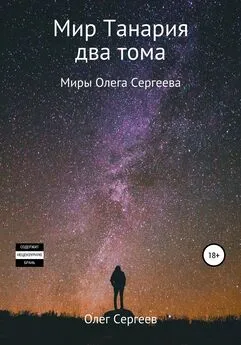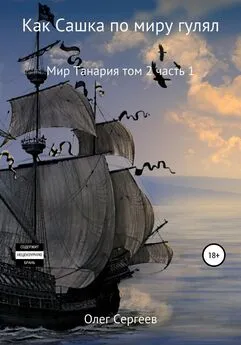Олег Арин - Мир без России
- Название:Мир без России
- Автор:
- Жанр:
- Издательство:Алгоритм-Книга, Эксмо
- Год:2002
- Город:Москва
- ISBN:5-699-00854-3
- Рейтинг:
- Избранное:Добавить в избранное
-
Отзывы:
-
Ваша оценка:
Олег Арин - Мир без России краткое содержание
Эта книга развеивает миф о статусе России как сверхдержавы. О. Арин приводит любопытные примеры, которые обнажают противоречия между реальными возможностями сегодняшней России и ее внешней политикой.
Почти по всем затронутым автором проблемам его взгляды не совпадают с общепринятыми трактовками и подходами.
Книга содержит таблицы. (DS)
Концы страниц размечены в теле книги так: <!-- 123 -->, для просмотра номеров страниц следует открыть файл в браузере. (DS)
Мир без России - читать онлайн бесплатно полную версию (весь текст целиком)
Интервал:
Закладка:
Strategic Assessment 1997. Flashpoints and Force Structure. Wash., DC, NDU, 1997.
Strategic Assessment 1998. Engaging Power for Peace. Wash., DC, NDU, March 1998.
Strategic Assessment 1999. Priorities for a Turbulent World. Wash., DC, NDU, 1999.
Talbott, Strobe. Russia: Its Current Troubles and Its On-Going Transformation
(Testimony before the Senate Foreign Relations Committee). Washington, DC, September 23, 1999.
Tarn Henry Communitarianism. A New Agenda for Politics and Citizenship. Macmillan Press Ltd, 1998.
The Theory and Practice of International Relations. William C. Olson, David S. McLellan, Fred A. Sondermann. Sixth Edition. Prentice-Hall, Inc., Englrwood Cliffs, New Jersey, 1983.
Thurow, Lester. The Future of Capitalism. London: Nicholas Brealey, 1996.
Transforming Defense. National Security in the 21st Century. Report of the National Defense Panel. Arlington, VA, December 1997.
U.S. National Security: Beyond the Cold War. Strategic Studies Institute, 1997.
United States Security Strategy for the East Asia-Pacific Region, The. 1998. U.S. Department of Defense, Washington, DC, November 1998.
Wagar W. Warren. TOWARD A PRAXIS OF WORLD INTEGRATION. Volume 2, № 2, 1996.
Wagar W. Warren. A Short History of the Future. 2nd ed. Chicago: Chicago University Press, 1992
Wallerstein, Immanuel. The Modem World-System and Evolution. — Journal of World-Systems Research: Volume 1, Number 19, 1995.
Ward, Hugh. Structural Power — A Contradiction in Terms? — Political Studies, (XXXV), № 4, 1987.
Weltpolitik. Strukturen-Akteure-Perspektiven. Hrsg. K.Kaizer u. H. —P. Schwarz. Stuttgart: Klett-Gotta, 1985.
What about Russians and Nuclear War? NY: Pocket Books, 1983.
What Is to Be Undone? A Russia Policy Agenda FOR THE New Administration. The Nixon Center, Febr. 2001.
Xu Mingqi. Economic Globalization, Defects in International Monetary System and Southeast Asian Financial Crisis. In SASS Papers, № 8, 2000. Shanghai Academy of Social Sciences.
1
Sun Tzu. The Art of War. Translated by Thomas Cleary. Boston and London: Shambhala, 1988, p. 82.
2
American National Security. Amos A. Jordan, William J. Tailor, Jr, and Michael J. Mazarr. Baltimore and London: The Johns Hopkins University Press, 1998, p. 4.
3
International Relations. Theory Today. Ed. By Ken Booth and Steve Smith. Cambridge: Polity Press, 1997, p. 334.
4
И здесь начинаются проблемы перевода, поскольку авторы не определили слово strength.
5
К примеру, см.: Masao Maniyama. Thought and Behaviour in Modern Japanese Politics. Oxford University Press, Tokyo, Oxford, NY, 1979, p. 268–289; Weltpolitik. Strukturen-Akteure — Perspektiven. Hrsg. K. Kaizeru. H. —P. Schwarz. Stuttgart: Klett-Gotta, 1985; Hugh Ward. Structural Power — A Contradiction in Terms? — Political Studies (XXXV), № 4, 1987, p. 593–610.
6
The Culture of National Security: Norms and Identity in World Politics. /Ed. by Peter J. Katzenstein. NY: Columbia University Press, 1996.
7
Р. Ш-А. Алиев. Внешняя политика Японии в 70-е — начале 80-х годов (Теория и практика). М.: Наука, 1986, с. 284–285.
8
Международные отношения, политика и личность. (Ежегодник САПН, 1975). М.: Наука, 1976; Политические системы современности (Очерки). М.: Наука, 1978; Национальные интересы: теория и практика (Сборник статей). М.: ИМЭМО, 1991.
9
The Origins of National Interests. Editors: Glenn Chafetz, Michael Spirtas, Benjamin Frankel. London*Portland: Frank Cass, 1999.
10
См.: Р. Ш-А. Алиев. Внешняя политика Японии, с. 148–164.
11
Цит. по: Michael С. Desch. Culture Clash. Assessing the Importance of Ideas in Security Studies — International Security, Vol. 23, № 1 (Summer 1998), p. 151
12
Hans Binnendijk with Alan Henrikson. Back to Bipolarity? — Strategic Forum, Number 161, May 1999. — Internet.
13
Анализ «Стратегических оценок» за 1996 г. сделан в моей книге «Азиатско-тихоокеанский регион: мифы, иллюзии и реальность». М.: Наука, 1997, с. 220–222.
14
Strategic Assessment 1997. Flashpoints and Force Structure. Wash., NDU, 1997. — Internet.
15
Strategic Assessment 1998. Engaging Power for Peace. Wash., NDU, March 1998. — Internet.
16
Strategic Assessment 1999. Priorities for a Turbulent World. Wash., NDU, 1999. — Internet.
17
Фактически этот документ является уточнением и дополнением к пентагоновскому «Обзору по национальной обороне» (the Repon of Quadrennial Defense Review /QDR/).
18
P. Samuel Huntington. The Clash of Civilizations and the Remaking of World Order. London… Touchstone Books, 1998.
19
С Милошевичем, правда, получилась промашка.
20
Zbigniew Brzezinski. America in the World Today. — In Complexity, global Politics, and National Security. Ed by David S. Alberts and Thomas J. Czerwinski. Wash., DC: National Defense University, 1997. — Internet.
21
Zbigniew Brzezinski. Living With Russia. — The National Interest. № 61, Fall 2000. — Internet.
22
Stephen Sestanovich. Where Does Russia Belong. — The National Interest. 62, Winter 2000/2001. — Internet.
23
The New Russian Foreign Policy. Edited by Michael Mandelbaum. COUNCIL ON FOREIGN RELATIONS, NY, 1998. — Internet.
24
Strobe Talbott. Russia: Its Current Troubles and Its On-Going Transformation (Testimony before the Senate Foreign Relations Committee). Washington, DC, September 23, 1999. — Internet.
25
Подр. на эту тему см.: Strobe Talbott. Dealing with Russia in a time of troubles. — The Economist. November 21st, 1998, p. 50–52.
26
R. Craig Nation and Michael McFaul. THE UNITED STATES AND RUSSIA INTO THE 21ST CENTURY. Strategic Studies Institute. October 1, 1997, p. 49.
27
Любопытно, что Макфол всю международную систему рассматривает через призму идеологии «ядра», не замечая, что внутри этой международной системы существуют и другие идеологии, например социалистическая идеология Китая.
28
Iden Lecture by Lee Hamilton. Changes in American Foreign Policy Over the Past 30 Years. — Institute for the Study of Diplomacy, November 18, 1998. — Internet.
29
Kay Bailey Hutchison. A Foreign Policy Vision for the Next American Century. — Heritage Lectures, 639, July 9, 1999.
30
U. S. National Security: Beyond the Cold War. Strategic Studies Institute, 1997. — Internet.
31
Robert F. Ellsworth. American National Security in the Early 21st Century. In U. S. National Security: Beyond the Cold War.
32
Ronald Steel. The New Meaning of Security. In U. S. National Security: Beyond the Cold War, p. 40.
33
Напомню, что основателями этой теории были Г. Моргентау, А. Вольферс и др. Тем не менее Стил не совсем прав: в годы холодной войны парадигмы менялись: в период правления Л. Джонсона и Р. Рейгана, например, доминировала школа «идеалистов».
34
Sources of Conflict in the 21st Century. Regional Futures and U. S. Strategy. /Ed by Zaimay Khalilzad, lan O. Lesser. Rand, 1998. — Internet.
35
Chapter two. Zaimay Khalilzad, David Shlapak with Ann Flanagan. Overview of the Future Securuty Environment. In: Sources of Conflict in the 21st Century.
36
John Van Oudenaren. Chapter Five. Sources of Conflict in Europe and the Former Soviet Union.
37
Issues'98: The Candidate's Briefing Book. Edited by Stuart M. Butler and Kim R. Holmes. Heritage Foundation, 1998, p. 364.
38
Dan Quayle. The Duty to Lead: America's National Security Imperative. — Heritage Lectures. № 630, January 21, 1999.
39
The State of Russian Foreign Policy and U. S. Policy Toward Russia. — «Heritage Lectures», 607, April 6, 1998. — Internet.
40
See: Andrei V. Kozyrev, «NATO Is Not Our Enemy», Newsweek, February 10, 1997, p. 31.
41
См.: Р. Ш.-А. Алиев. Внешняя политика Японии, с. 23–35.
42
Ariel Cohen. A NEW PARADIGM FOR U. S. — RUSSIA RELATIONS: FACING THE POST-COLD WAR REALITY. — The Heritage Foundation. Backgrounder No. 1105 March 6, 1997. — Internet.
43
Ariel Cohen. The «Primakov Doctrine@: Russia's Zero-Sum Game with the United States. The Heritage Foundation. FYI No. 167. December 15, 1997. — Internet.
44
ISSUES 2000. The Candidate's Briefing Book. Edited by Stuart M. Butler and Kirn R. Holmes. Wash. D. C., The Heritage Foundation, 2000. — Internet.
45
Ariel Cohen. Summit Rhetoric Aside, Putin's New Cabinet Makes Russian Reforms Less Likely. — Executive Memorandum. June 1, 2000.
46
David M. Lampton, Gregory C. May. A Big Power Agenda for East Asia: America, China, and Japan. The Nixon Center, 2000, p. iii. — Internet.
47
What Is to Be Undone? A Russia Policy Agenda FOR THE New Administration. The Nixon Center, February 2001, p. 3, 7.
48
Condoleezza Rice. Compaign 2000: Promoting the National Interests. — Foreign Affairs. January/February 2001. — Internet.
49
A National Strategy For a New Century. The White House, December 1999. — Internet.
50
United States Strategic Plan for International Affairs. First Revision — February 1999. В следующем году появился очередной Стратегический план госдепартамента (Strategic Plan. September 2000), но с содержательной точки зрения он почти ничем не отличается от предыдущего, за исключением некоторых новых моментов организационного характера.
Читать дальшеИнтервал:
Закладка:
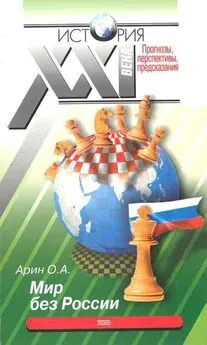

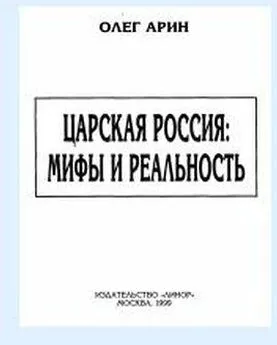
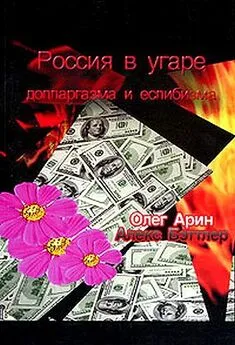
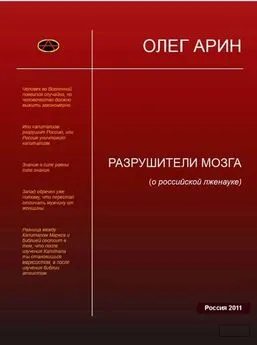
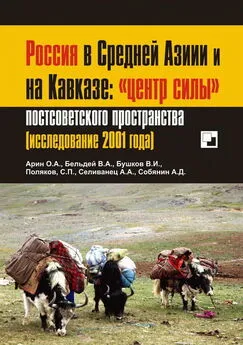
![Олег Арин - О любви, семье и государстве [Философско-социологический очерк]](/books/1089384/oleg-arin-o-lyubvi-seme-i-gosudarstve-filosofsko-sociologicheskij-ocherk.webp)
